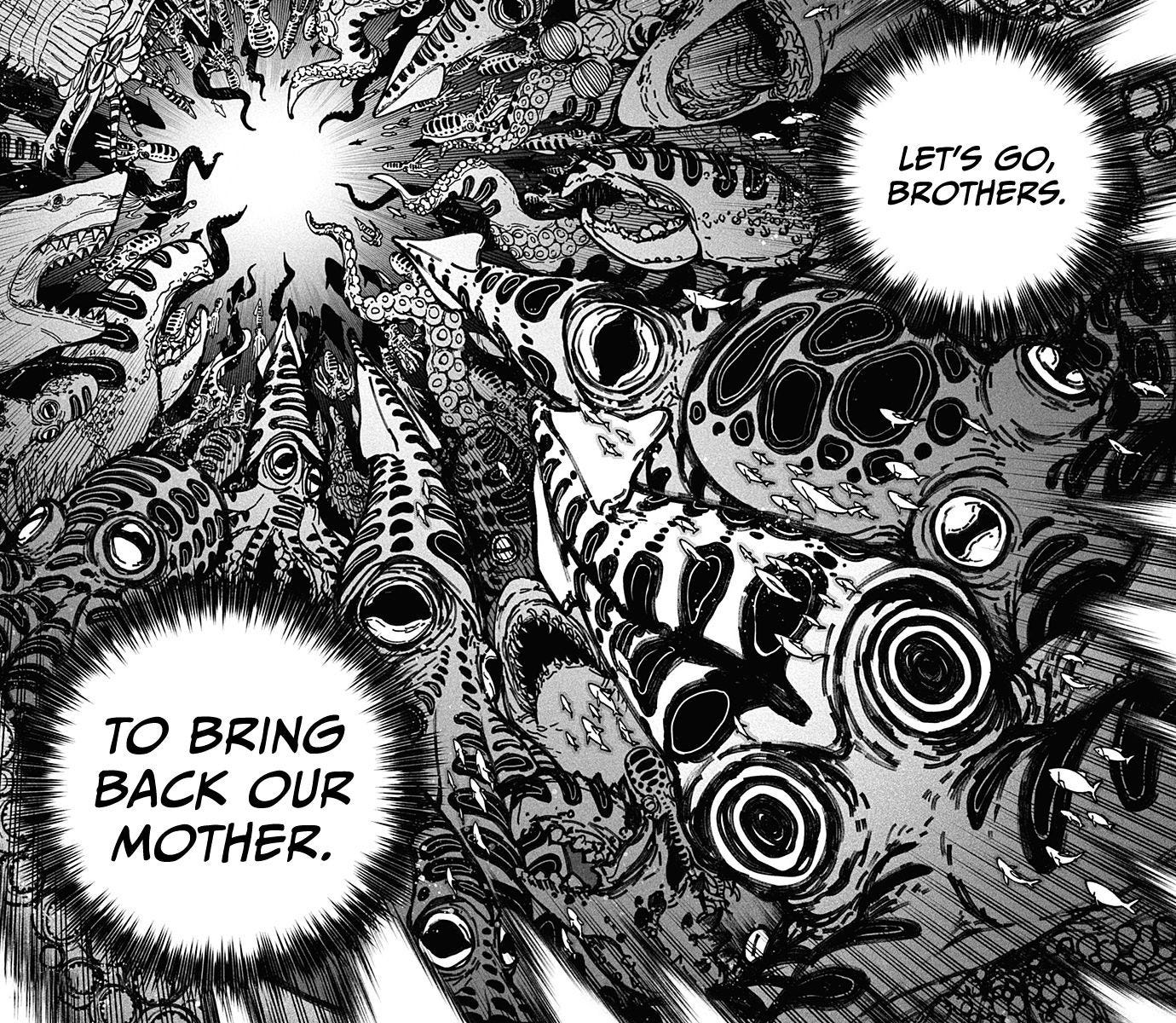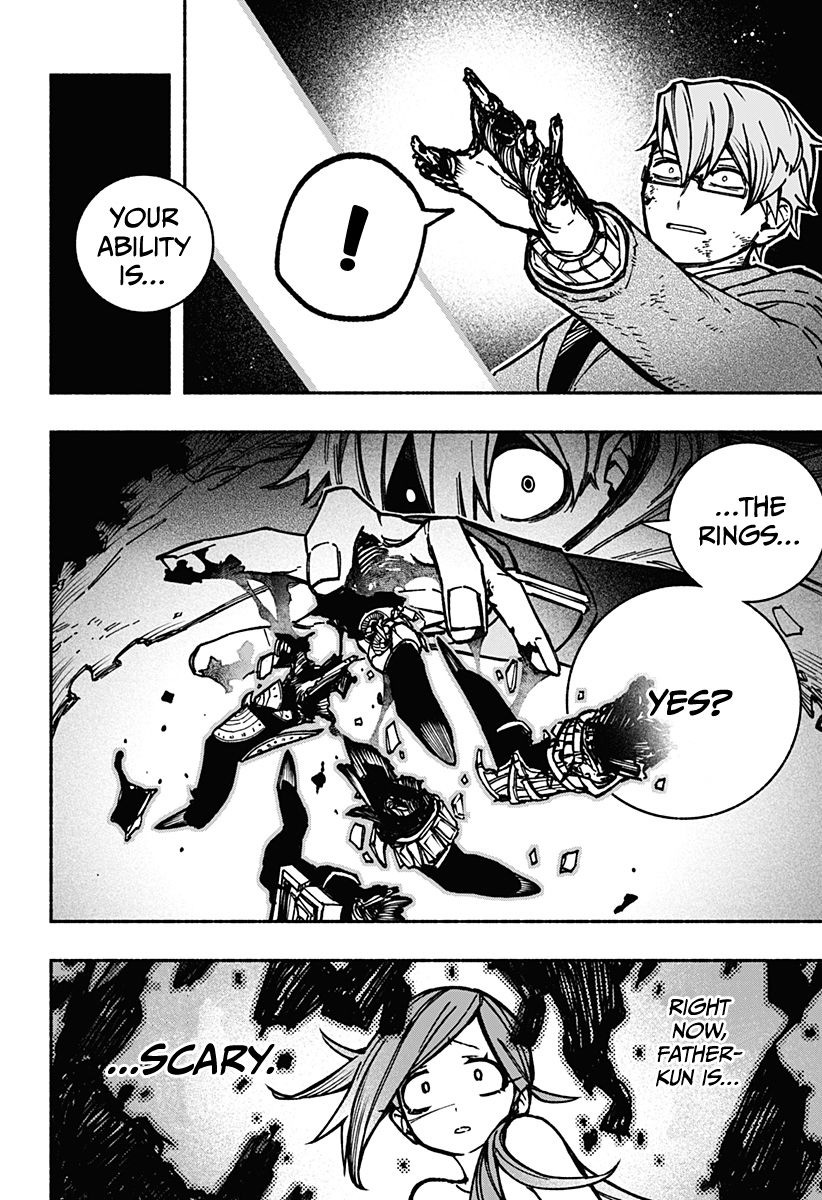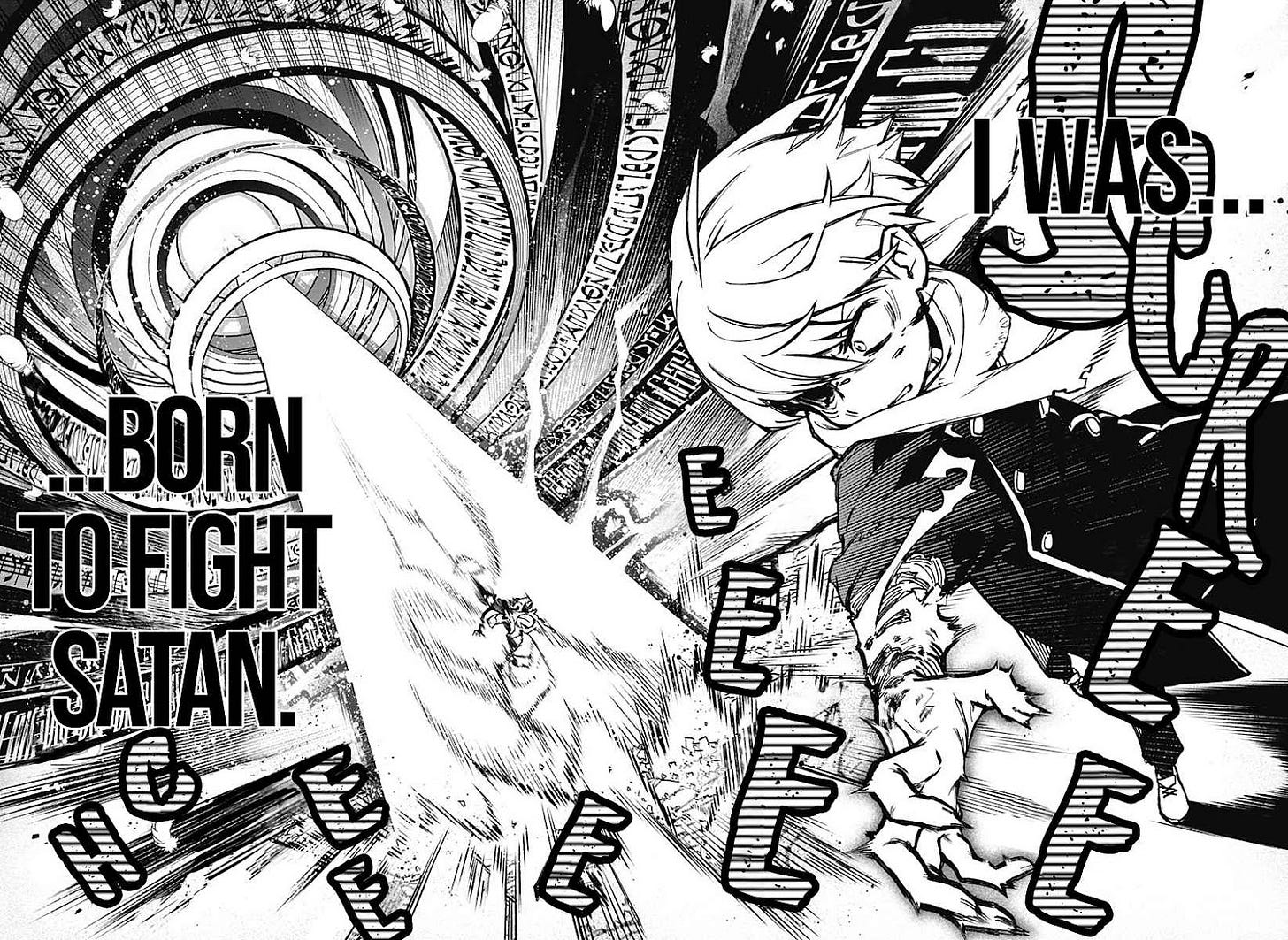I feel like not so long ago, pulp mangakas were really into angels and devils and Original Sin and that kind of thing. Then isekai1 and whatever this was came along and people moved on but… dude! It was pretty fun to watch fights between saints that were pimped out like a Hummer in Miami.
Make the Exorcist Fall in Love is a spiritual successor to all that schlock, and I thoroughly recommend it. It’s got everything you’d want out of a mid-brow battler seinen, and best of all it… kinda gets the source material? More after the jump.
Make the Exorcist Fall in Love follows the journey of a sexually traumatized kid named Father (go do the math on that) as he gets thrown into ridiculous, over-the-top fights with the Seven Deadly Sins. The catch? There’s a cute girl he likes.
As always, I wanna talk about the art for a second. I’d say it’s good, leaning towards genuinely great. The paneling isn’t exactly creative, but it’s well-executed. More importantly, the composition of some of the individual wide shots is exceptional.
Even fights with less important villains get panels like these:
On a related note, the character design is a nostalgic mix of the sleek and simple silhouettes of Fullmetal Alchemist, and the slightly edgier faces and outfits of Soul Eater. Like the former, it knows just how far to take its blood and gore; unlike the latter, it usually limits its racier impulses to the moments where they make sense.
All of this is tied together by some really gritty linework that interrupts the otherwise clean, inviting flow outside of fights. When Father gets hit by a blast, the manga makes it clear that he’s getting burnt to the bone. When he swings back, it’s got that punitive Old Testament wrath to it. Someone always gets their shit kicked in each battle, and the rough power behind everything goes a long way to add suspense. The powers are pretty metal, too. Remember when Lot’s wife got turned into a friggin pillar of salt? This series certainly did.
In any event, this is the artist Masuku Fukuyama’s first manga, and I’m impressed. There’s nothing I can immediately point out as original, but the final package is definitely greater than the sum of its parts.
I’d say the same more or less goes for the story. When you boil the manga down to its basic components, it’s not all that different from any other battler manga2. Father fights the latest Big Bad. There’s some downtime where he recovers and builds his relationship with the people around him. A moral complication is introduced, and then the process repeats itself.
No, what really carries Make the Exorcist Fall in Love is its oddly Miltonic reinterpretation of Christianity. As in Paradise Lost, the devils here behave in the traditional antiheroic3 way — each is remarkably human, and some are even likable. The fights themselves are of course literal fights, but they each follow a sympathetic human failing to its postlapsarian conclusion.
Likewise, the heartwarming intermissions between each fight are undercut by a nagging feeling that you’re being lead by the nose into Sin, even as you struggle to think of anything actually sinful. It’s that capital-“C”-Classical tension between stoicism and epicureanism that structures a lot of early Christian debate, except it’s in a battle manga with (holy) orbital cannon attacks and (creepy) witch harems.
Which brings me to the last thing I wanted to talk about here. This manga has a lot of vulgar nudity — the kind I normally loathe — but I’m going to go out on a limb and defend it. As I mentioned earlier, the main character is a sexually assaulted kid whose moral compass is about as warped as any other kid raised by the Catholic church. Even ignoring the latent perversity of this manga’s gothic inspirations, the idea that such a kid would have upsetting, violent reactions to nudity and seduction isn’t exactly hard to understand. I mean, Joyce had a whole book about it and we all thought that was cool4.
All of this is to say that Make The Exorcist Fall in Love isn’t just another battler, or a romance, or even a seinen. It’s a decidedly moving exploration of Christian faith hiding behind the violence and nudity of a far more crass manga. I’m not saying you have to buy it all, or that you can’t find some of its more raunchy panels to be a tad excessive; I’m just saying you should give it the benefit of the doubt.
Finally, I’d like to note on a more banal level that the manga’s characters are all likable, and their dialogue was clearly written by an astute conversationalist. As with all good romance manga, there’s an incredibly natural progression to characters' relationships based on straightforward back-and-forths and sharp internal monologues. No wrung-out drama for the sake of it. If you don’t care all that much for that esoteric morality play crap, you’ll still have a pleasant time and feel invested in each character you meet.
Would I recommend Make the Exorcist Fall in Love? I think so, but I’d include some caveats. This is ultimately a manga about Christian morality’s relationship to love and sex. It’s also a battler seinen. If either of those descriptions make you squeamish — and I completely get it if they do — I’d say you should skip this manga. However, if any of that interests you, this is a pretty special series that could use your support.
Final Rating: 8/10
I’d argue that isekai subsumed that gothic impulse what with its Elf Nuns and Demon Kings and general repressed lechery, but there’s definitely something far more sinister about how it does it all.
I’m thinking something like Holyland and all its terrible Korean knockoffs, or maybe even JoJo’s.
Please no “Lucifer was the hero/wasn’t the hero/it’s beyond the point” comments. It’s been years since I read Paradise Lost.









Eu acho esse SHOUNEN não seinen um pouquinho too much, não acho que o mangá tinha que ser leve, mas o autor ele vai muito no Over the top com o tema do abuso me tipo o Fujimoto em Fire Punch querendo chocar a todo momento, perde impacto fica excessivo. Ainda mais com temas muito sensíveis, só que de certa forma mesmo sendo ruim nessa retratação, ele faz um paralelo interessante do abuso pela instituição aqui religiosa, mas também pela figura da succubus tal como Chainsaw Man do mesmo autor de Fire Punch ser o escolhido aqui o messias só faz mal para esse indivíduo que deveria ser uma criança normal ter uma vida saudável e isso não é fornecido pra ele, essa visão redime um pouco os excessos, mas não é uma obra que eu vou ler "religiosamente", mas de vez em quando eu vou dar uma olhada.